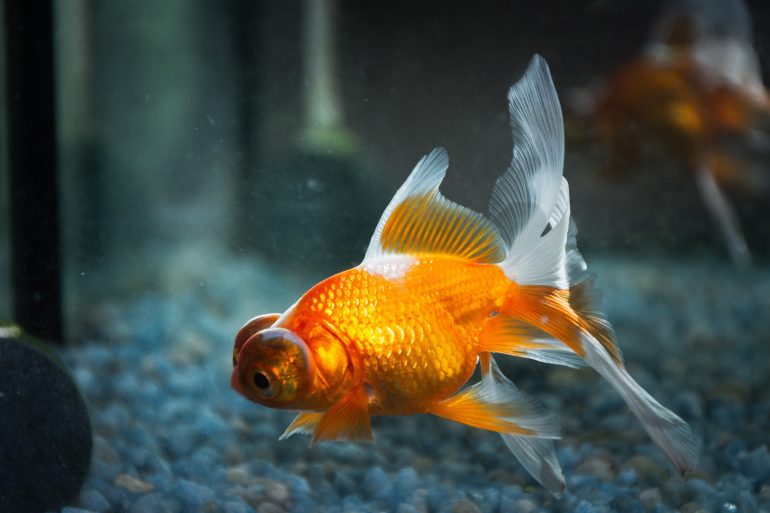- Your cart is empty
- Continue Shopping
Goldfish Care – 2022

Goldfish
Goldfish are a popular type of freshwater fish that are known for their bright colors and playful personalities. They are one of the most commonly kept aquarium fish and are prized for their beauty and ease of care.
Goldfish belong to the carp family and are native to East Asia. They have first domesticated in China over a thousand years ago and were initially kept for their beauty and as a status symbol. Over time, goldfish were bred to have a wide variety of colors and patterns, and today there are over 120 different breeds of goldfish.
One of the most distinctive features of goldfish is their long, flowing fins and tails. These fins help the fish swim and maneuver, making them more attractive to potential mates. Goldfish are also known for their bright colors, which can range from red, orange, yellow, and white, to black, blue, and even purple.
In terms of care, goldfish are relatively easy to keep. They are hardy fish that can tolerate a wide range of water temperatures and pH levels, and they are not very demanding in terms of their diet. Goldfish are omnivores, which means they will eat a variety of foods, including pellets, flakes, and live or frozen foods. It's important to feed them a balanced diet and to avoid overfeeding, as this can lead to health problems and poor water quality.
Goldfish are social creatures and do best when kept in groups. They are also relatively long-lived and can live for up to 10 years with proper care. It's important to provide them with a spacious aquarium or pond, with plenty of room to swim and explore. Goldfish are also sensitive to changes in their environment, so it's important to maintain a consistent routine for feeding and tank maintenance.
Overall, goldfish are beautiful and engaging pets that can provide hours of enjoyment. With proper care and attention, they can be a low-maintenance addition to any home aquarium or pond.

- Goldfish are Coldwater fish, which means they do best in temperatures between 65- and 72 degrees Fahrenheit.
- Goldfish are members of the carp family and are closely related to koi fish.
- Goldfish are one of the oldest domesticated fish species and have been kept as pets for over a thousand years.
- Goldfish are intelligent creatures and can be trained to do a variety of tricks, such as swimming through hoops and fetching objects.
- Goldfish are sensitive to changes in their environment and can become sick or stressed if their tank or pond is not adequately maintained.
- Goldfish are available in various colors and patterns, including calico, red and white, black, and even metallic hues.
- Goldfish can grow to be quite large, with some varieties reaching up to 12 inches in length.
- Goldfish are generally peaceful fish, but some breeds may be more aggressive or territorial and may need to be kept separately from other fish.
- Goldfish are sensitive to changes in water quality and require regular partial water changes and filtration to keep their tank or pond clean and healthy.
- Goldfish are a popular choice for outdoor ponds, as they are Coldwater fish and can tolerate cooler temperatures. However, it's important to bring them indoors during the winter to prevent them from freezing.
- Goldfish are prone to a variety of health problems, including swim bladder disease, fin rot, and bacterial infections. These conditions can be prevented with proper care, including regular water changes and a balanced diet.
- Goldfish are sensitive to chemicals and pollutants and should not be kept in tanks or ponds with harsh cleaners or medications.
- Goldfish are sensitive to overfeeding and can become obese if given too much food. It's important to feed them a balanced diet and to avoid overfeeding.
- Goldfish are social creatures and do best when kept in groups. A single goldfish may become lonely and stressed and may not thrive in a solitary environment.
- Goldfish are sensitive to changes in their environment and can become sick or stressed if their tank or pond is not adequately maintained. It's important to keep the water clean and well-oxygenated and to provide them with a spacious, well-maintained tank or pond.
- Goldfish are not a good choice for small tanks or bowls, as they require a lot of space to swim and thrive. It's important to provide them with a large aquarium or pond with plenty of room to move.
- Goldfish are sensitive to changes in water temperature and can become sick or stressed if the water in their tank or pond is too cold or too warm. It's important to maintain a consistent water temperature and to avoid sudden changes.

